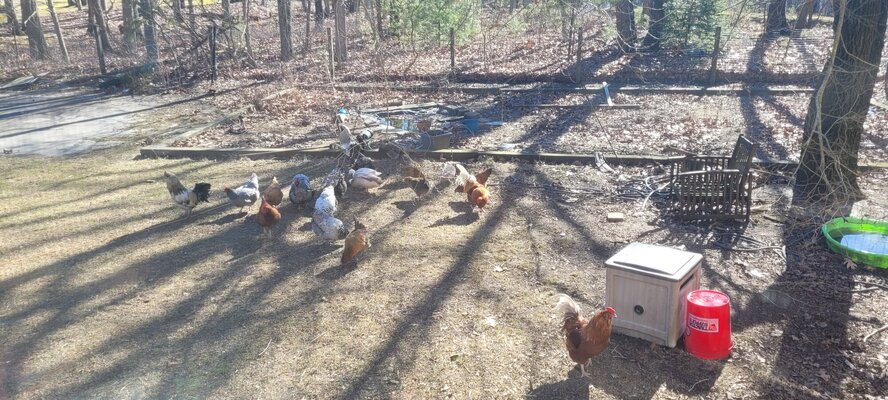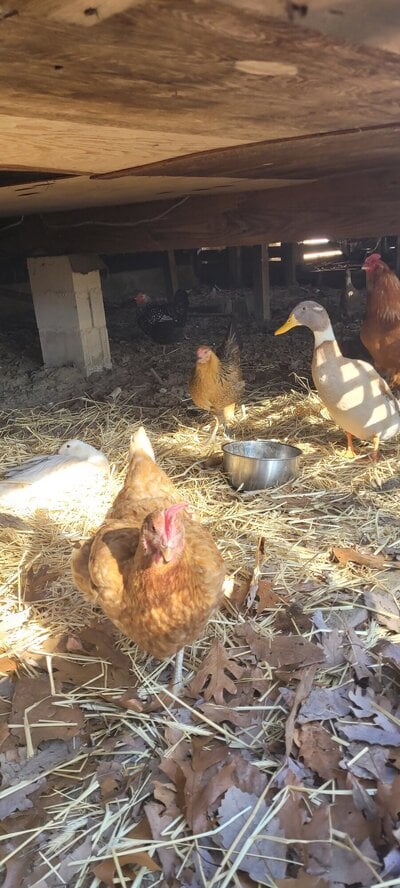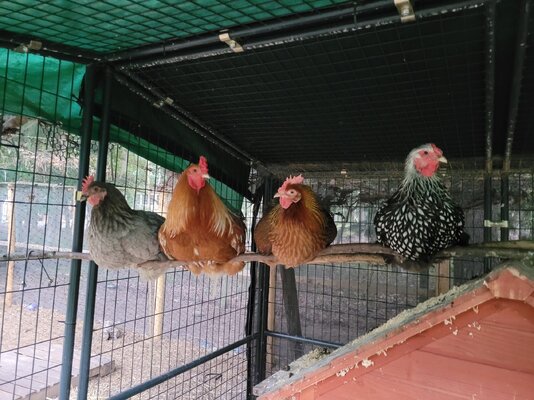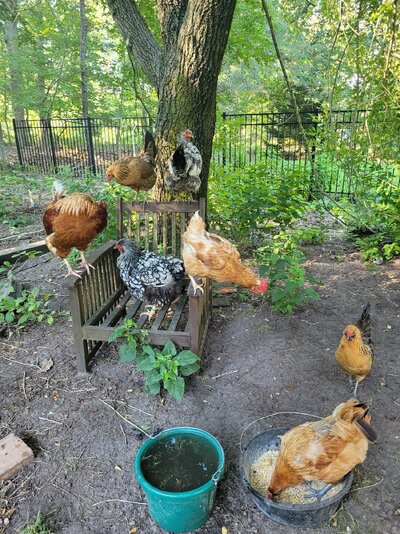This is a really good, in-depth article on roo behavior, and very helpful. Thanks!
Navigation
Install the app
How to install the app on iOS
Follow along with the video below to see how to install our site as a web app on your home screen.
Note: This feature may not be available in some browsers.
More options
You are using an out of date browser. It may not display this or other websites correctly.
You should upgrade or use an alternative browser.
You should upgrade or use an alternative browser.
Understanding Your Rooster.
- Author Shadrach
- Publish date
- Article read time 37 min read
- Chickendoodles
- 5.00 star(s)
- Debbie292d
- 5.00 star(s)
This is an encyclopedia article for anyone wanting to learn to understand their rooster! Completely thorough on every aspect.
I was particularly interested in the section on tribeless roosters. We breed silkies here, and can't use all of the roosters, so the rest, around a dozen, all free range. There are no hens free-ranging, they're in breeding pens.
I save these roosters because I may use them as they're beautiful or of the color I want to use down the road. They free range until then. They do get along for the most part, although today I noticed one breeding another one, and the "victim" took it like a hen. That was odd.
They do have a spat now and then, but they normally roam peacefully around the yard and it's quite pretty to see.
I was particularly interested in the section on tribeless roosters. We breed silkies here, and can't use all of the roosters, so the rest, around a dozen, all free range. There are no hens free-ranging, they're in breeding pens.
I save these roosters because I may use them as they're beautiful or of the color I want to use down the road. They free range until then. They do get along for the most part, although today I noticed one breeding another one, and the "victim" took it like a hen. That was odd.
They do have a spat now and then, but they normally roam peacefully around the yard and it's quite pretty to see.
- Twilia
- 5.00 star(s)
In the age of "instant reads', not everything can be properly covered like that.
The article covers the depth of behavior in a valuable experience/studied format which is preferable to form ideas about. Organized; the perfect foundation for advancing animal behavior study (is logically analyzed experience).
The article covers the depth of behavior in a valuable experience/studied format which is preferable to form ideas about. Organized; the perfect foundation for advancing animal behavior study (is logically analyzed experience).
Shadrach
Thanks for the review. I'm pleased to read in your comments below that the content matches your experience.
- HenHypochondriac
- 5.00 star(s)
My new go to encyclopedia on everything rooster!
- 16 and me
- 5.00 star(s)
Thank you so much Shadrach! This is an excellent and comprehensive article, well written and enjoyable with the story-telling of your tribes. I wish I had read this a year ago, before culling my 2nd in command Polish rooster. He often ran at me - and I did the foot shuffle at him, which I now see was an act of aggression that by nature he had to respond to. A year later, and his #1 hen has still not accepted the #1 roo (Ameraucana) which has caused some stress for both of them. He isn't tolerating her lack of submission very well, and likely due to the stress, she hasn't laid an egg since shortly after her roo's death. They do form strong bonds.
I have 3 cockerels now to choose one from. The offspring of the Ameraucana, (a mix) who in his first 4 months has been great. Same temperament as his sire - calm and confident. He is a teen now and trying to establish himself a flock. He doesn't court though - just strikes & strikes out. Do you know if early behaviours are indicative of the temperament they will have as adults? Is his pre-teen days a sign of a good roo? I have to choose between him and 2 younger Blue Copper Marans, who are about 15 weeks now - and one of them is huge! Any thoughts on Blue Copper Marans roosters tolerating other Roosters?
I have 3 cockerels now to choose one from. The offspring of the Ameraucana, (a mix) who in his first 4 months has been great. Same temperament as his sire - calm and confident. He is a teen now and trying to establish himself a flock. He doesn't court though - just strikes & strikes out. Do you know if early behaviours are indicative of the temperament they will have as adults? Is his pre-teen days a sign of a good roo? I have to choose between him and 2 younger Blue Copper Marans, who are about 15 weeks now - and one of them is huge! Any thoughts on Blue Copper Marans roosters tolerating other Roosters?
Shadrach
A lot will depend on how you keep them. Personailty has a role but if they got enough space they can avoid problems rather than have to confront them.
I don't try to assess a chickens personality until they are over a year old.
I don't try to assess a chickens personality until they are over a year old.
- Nym
- 5.00 star(s)
What amazing observations! This is a must-read for those new, and some seasoned, keepers of chickens.
After being 'attacked' by my Araucana cockerel yest eve I was ready to return him to his breeder. But I sat here til late last nite reading and this morning asked the breeder to give me a few more days.
After being 'attacked' by my Araucana cockerel yest eve I was ready to return him to his breeder. But I sat here til late last nite reading and this morning asked the breeder to give me a few more days.
- Leatherworker
- 5.00 star(s)
Terrific article a must read for all who have chickens.
- Chicken6000
- 5.00 star(s)
Excellent!!!!!!!!!!!
- HorseGirlAbby
- 5.00 star(s)
What an amazing article, Shadrach! I appreciate all the hard work you put into it, and it definitely helps me understand my own guy better.
- fluffycrow
- 5.00 star(s)
Finally got round to reading this masterpiece. Thank you so much for writing this. It is well written, structured, and very easy to follow. I've noticed most of these behaviours with my own flock, and find them to be the epitome of chicken keeping. Those small behaviors, the everyday things are where the true beauty of chickens is. Thank you once again for writing this article!
- triciayoung
- 5.00 star(s)
As a rooster advocate, I find this the best article I have ever read. Thank you @Shadrach for the time and effort you put into observing and writing the facts, but facts with love for roosters.
- MrsNorthie
- 5.00 star(s)
This has given me so much hope for my boys! This is an amazing comprehensive education on Roosters! Thank you!
- Three Little Chicks
- 5.00 star(s)
I deeply enjoyed the scientific neutral point of observation. Thank you so much
- TropicalChickies
- 5.00 star(s)
This was interesting informative, inspiring, and very encouraging. I'm relatively new to hen keeping (4 years now) and completely new to roosters (I have two 5 month old cockerels who hatched at the same time here on the farm -- with probable but diluted gamefowl genetics. Yikes). But I'm fascinated with these animals and their complexities. I've learned how to treat most of the common problems competently. I take the time to observe and observing brings me great inner peace.
So given what I've read here about the tribe dynamics, I'm encouraged about the prospects for my two boys being able to live here, together but apart, with their own tribes. I've already seen how my little flock is naturally dividing itself between the hens who have been successfully claimed by the faster-maturing cockerel, and the others who are not so easily charmed showing a tolerance-bordering-on-friendship for the other one. I've mulled over the idea of creating a second space where the second cockerel could bond with a tribe of his own, and this article shows me that I could be on a good track with that.
Given that the chickens here already free roam and roost in their coop voluntarily, and I have a multi-acre land with trees orchards in a jungle environment (the Ecuador cloud forest), I can't think of a better place to carry on a similar multi-coop set up and observation experiment as you have done here.
It had also crossed my mind when reading advice like "You need at least 12 hens to 1 rooster" that this must be a result of keeping the birds somehow confined. Because you wouldn't find those ratios in a natural setting with jungle fowl. The way you've presented your observations just makes more intuitive sense with free roaming birds.
Thank you for the insights. I'm encouraged that I won't have to eliminate one of these handsome fellas.
Oh! And the part about the herding shuffle made me smile. Paco, the faster maturing cockerel, has been doing this to me every morning when I walk out to the feed area. Maybe he thinks I'm going to eat breakfast with them! Anyway, it didn't feel like aggression, but I was wondering what on earth he was doing... Thanks!
So given what I've read here about the tribe dynamics, I'm encouraged about the prospects for my two boys being able to live here, together but apart, with their own tribes. I've already seen how my little flock is naturally dividing itself between the hens who have been successfully claimed by the faster-maturing cockerel, and the others who are not so easily charmed showing a tolerance-bordering-on-friendship for the other one. I've mulled over the idea of creating a second space where the second cockerel could bond with a tribe of his own, and this article shows me that I could be on a good track with that.
Given that the chickens here already free roam and roost in their coop voluntarily, and I have a multi-acre land with trees orchards in a jungle environment (the Ecuador cloud forest), I can't think of a better place to carry on a similar multi-coop set up and observation experiment as you have done here.
It had also crossed my mind when reading advice like "You need at least 12 hens to 1 rooster" that this must be a result of keeping the birds somehow confined. Because you wouldn't find those ratios in a natural setting with jungle fowl. The way you've presented your observations just makes more intuitive sense with free roaming birds.
Thank you for the insights. I'm encouraged that I won't have to eliminate one of these handsome fellas.
Oh! And the part about the herding shuffle made me smile. Paco, the faster maturing cockerel, has been doing this to me every morning when I walk out to the feed area. Maybe he thinks I'm going to eat breakfast with them! Anyway, it didn't feel like aggression, but I was wondering what on earth he was doing... Thanks!
Shadrach
I'm pleased you found the article informative. It reads like you have a close to perfect opportunity to helo establish a couple of tribes. I found I needed to be one coop ahead of the current tribe occupancy. That will give you a spare should someone get sick or go broody or a rescue decides to make your place it's home. In your climate you certainly don't need anything elaborate. The longer the males are housed together the higher the chances are that they will fall out and fight.
- CackleBabies
- 5.00 star(s)
Great information. I’ve learned a lot about rooster behavior and keeping multiple roosters in my flock. It’s helped me better understand flock dynamics and rooster behaviors.
- Cj Tracker
- 5.00 star(s)
I love the details in here!!
I thought I was one of a few crazy rooster and hen Moms. I have 6 roosters, 3 ducks and and 16 hens. I spent alot of time trying to mediate fighting. there have been a few with bloodshed so I do run out if I think it's getting out of hand. But they free range almost all day. the roosters more aggressive behavior early morning and night always led me to believe either 1) he's trying to mate to further his gene pool 2) early morning and dusk and predator times and they genetically have to be more aggressive should they need to ward them off during this time
unfortunately most I know tend to cull their roosters but I don't think they took the time to appreciate their worth, watch their gifting traits to the girls, and just realize they want to do their protective jobs in their short time in this earth.
I love my boys! thanks for sharing things even I didn't know even after spending hours each day with them.
I thought I was one of a few crazy rooster and hen Moms. I have 6 roosters, 3 ducks and and 16 hens. I spent alot of time trying to mediate fighting. there have been a few with bloodshed so I do run out if I think it's getting out of hand. But they free range almost all day. the roosters more aggressive behavior early morning and night always led me to believe either 1) he's trying to mate to further his gene pool 2) early morning and dusk and predator times and they genetically have to be more aggressive should they need to ward them off during this time
unfortunately most I know tend to cull their roosters but I don't think they took the time to appreciate their worth, watch their gifting traits to the girls, and just realize they want to do their protective jobs in their short time in this earth.
I love my boys! thanks for sharing things even I didn't know even after spending hours each day with them.
Attachments
Last edited:
- aking19
- 5.00 star(s)
This was an amazing read! Major kudos on this. I spend a lot of time observing and interacting with my own flock and have seen a lot of the behaviors mentioned here but misinterpreted some of them, especially when my cockerel interacts with me. Thank you for sharing this invaluable information! Makes me appreciate these fellas even more!
- Hip Hillbilly Acres
- 5.00 star(s)
I thoroughly enjoyed reading this article. Much was mentioned that I would not/did not even know to question. The thoroughness and time spent putting this together . . . bravo and thank you!
- sailrnest
- 5.00 star(s)
Loved the read! I have 2 Roos. 1 Tom is Oliver Egger 18 months older then the other Caillou Copper Maran who was hatched from Purchased eggs slipped under a broody. (At the time I had 20 hens and wanted dark chocolate eggs to go with my rainbow collection) It has been interesting watching the 2 as they share a coop and run as well as free range acre. Everything described in cockerel behavior of building his tribe is what my Caillou did. Tom will still chase Caillou across the yard and and Caillou will still stand on the side while Tom eats the treats tossed out to everyone even after 4 years but at night they each sleep with their own girls next to them.


Last edited:
×




